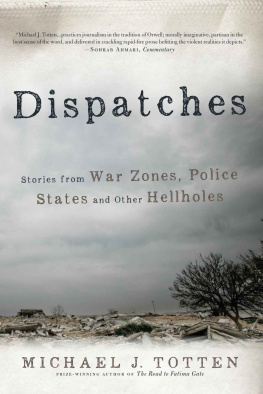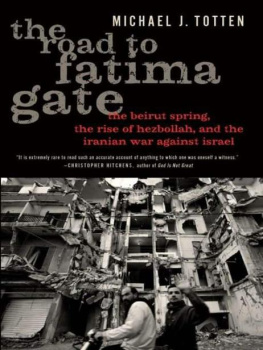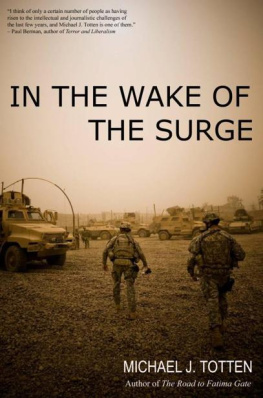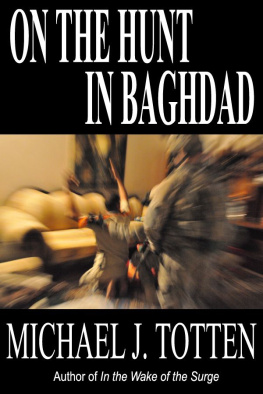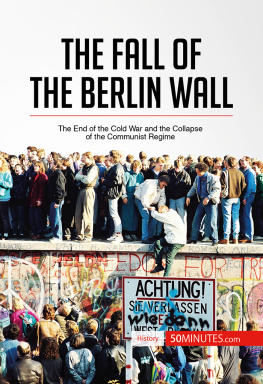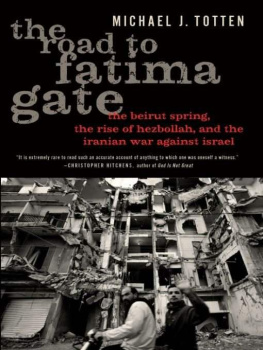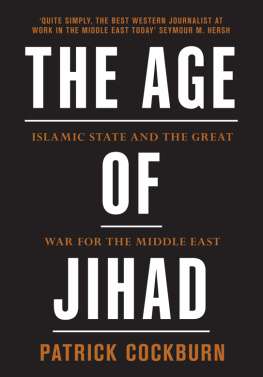Dispatches
Stories from War Zones, Police States and Other Hellholes
MICHAEL J. TOTTEN
Contents
One
The July War
Lebanese/Israeli border 2006
Early in the morning on July 12, 2006, Ehud Goldwasser and Eldad Regev were on patrol near the Northern Israeli town of Zarit, just south of the border with Lebanon, when unseen guerrillas ambushed their Humvee. Three of their fellow soldiers were killed in the attack, but Goldwasser and Regev fared even worse; they were captured by Hezbollah and dragged over the border fence into the wilds of South Lebanon.
The Israeli response was formidable. Another Israel Defense Forces soldier, Gilad Shalit, had been snatched just two weeks before by Palestinians and smuggled through a tunnel into Gaza. Israelis were in no mood to tolerate cross-border attacks on two fronts at once. Prime Minister Ehud Olmert promised a very painful and far-reaching response. He launched artillery and air strikes at Hezbollahs positions in South Lebanon, at the command and control centers in the suburbs south of Beirut, and at infrastructure throughout the country, including roads, bridges, and Beiruts international airport.
Hezbollahs response was likewise ferocious. Its fighters fired thousands of World War II-era Katyusha rockets at Israeli civilian population areas in the cities of Haifa, Kiryat Shmona, Nazareth, and Tiberias. The entire northern sixth of the countryincluding Arab-majority areaswas blanketed with constant daily rocket attacks. Hezbollah wanted a brief border skirmish and an exchange of prisoners but instead found itself in a full-scale war that produced millions of refugees and devastated parts of both countries.
I was in Iraq when it started and could not get into Lebanonthe Israeli Air Force had put holes in the runway at the airport to prevent Hezbollah from flying the captured soldiers out to Iran. So I teamed up with my friend and colleague Noah Pollak, then-assistant editor at Azure magazine in Jerusalem, and took a rental car from Tel Aviv to the Israeli side of the front.
By then the war had been blazing for weeks. The Israeli government was proposing a cease-fire to end it even though Israel had so far gained practically nothing. It wasnt yet over, but it was already widely seen as a debacle. There was talk in the local newspapers about removing Olmert from the prime ministers office immediately. But the farther north we drove, the less relevant any talk of cease-fires and parliaments seemed. The fighting raged on, and we were approaching Hezbollahs shooting gallery.
Haifa, Israels third-largest city, was empty and burning, as was every other city in the country near the Lebanese border.
Traffic thinned as we drove, but we hadnt yet seen overt signs of war. At some point we would cross an invisible boundary between the safe part of Israel, supposedly beyond the range of Hezbollahs rockets, and the kill zone. Neither Noah nor I knew exactly where that boundary was, but every mile we traveled brought us closer.
When we arrived at the resort town of Tiberias on the shore of the Sea of Galilee, it looked like a city at the end of the world. The streets were entirely empty of people and cars. More than a million civilians had packed up their valuables and fled south in their vehicles. Only a handful of brave, elderly, sick, poor, stubborn, and possibly suicidal people remained. It would have made a terrific set for a zombie movie.
Stop the car, I said to Noah. I want to get out.
Noah stopped the car in the middle of a major intersection. There was no need to pull over or park because there was no traffic.
I stepped out of the car. It was the middle of summer, and we were well below sea level. The air was unbearably hot, humid, heavy, and still. Nothing moved. Nothing seemed real. I heard no sound at all except the chirping of birds in the middle of a major city at noon. We shouldnt be here, I thought. I expected an explosion at any moment, but I couldnt see any damage and wasnt sure whether we were actually inside, or just near, Hezbollahs rocket range.
I got back in the car and we continued to drive. Just past the city and beyond the shores of the sea, we saw hillsides scorched from Katyusha fire. We were inside the zone now and could be killed at any time without warning.
As we approached the city of Kiryat Shmona, I braced for hell. It seemed to be Hezbollahs target of choice. It was so close to the borderless than two miles awaythat there was no time to warn civilians to head to the bomb shelters when incoming rockets were detected on radar. They often exploded at the same instant the air-raid sirens turned on, and sometimes even before.
My colleague Lisa Goldman had been up there just a few days earlier with a colleague, and she described the scene as a horror.
The nearly abandoned city reminded us of scenes in Hollywood movies set in Grozny, she wrote, or Sarajevo, circa 1992. Brush fires set off by Hezbollah rockets blazed everywhere, creating a thick pall of smoke that dimmed the usually bright Levantine sunlight. Bits of ash floated about like snowflakes, the smell of smoke permeated the air and was absorbed in my clothes and hair. And the constant booms, explosions and sirens provided loud background musica live, postmodern version of Albinonis Adagio in G Minor for this long shot of Apocalypse Now: The Middle Eastern Version. Lisa and her journalist colleague drove as fast as physically possible through burning streets, walls of fire just feet from each side of the car.
Noah and I heard air-raid sirens wailing even out in the countryside as we closed in on the city.
Israeli civil defense instructed everyone to pull over and get out of and away from their cars when they heard the sirens. A nearby explosion could startle drivers and cause them to crash. That wasnt all. Katyusha shrapnel punctured vehicles as though they were made of paper, and direct hits to gas tanks instantly turned cars and trucks into fireballs.
When we finally reached the city, it looked surprisingly okay from the main road. Although we drove fast through the streets and the nonfunctioning traffic signals, I saw no fires, no smoke, and no serious damage.
It was a good day to drive through. Storms of incoming rockets moved through the north like malevolent weather.
I unfolded our map and looked for the turnoff to Kibbutz Misgav Am. Military historian Michael Oren, author of Six Days of War , spokesman for the IDF Northern Command waited for us there. (He would later be appointed Israels ambassador to the United States.) It wasnt clear which road we should take, so after we passed Kiryat Shmona, we pulled off to the side of the road and asked directions from two officers in an idle police car.
I stepped out into the road and nearly jumped out of my skin as I heard and felt a loud BOOM from just on the other side of a nearby hill.
Outgoing, Noah said to put me at ease. I laughed and said of course, although to me at the time there was no such thing as of course. Noah had visited the border just a few days before and was much more comfortable in that environment. I hadnt yet learned to distinguish the sounds of incoming and outgoing.
The officers told us how to get to Kibbutz Misgav Am, which was not really a kibbutz. It was a military base on the border. They didnt ask us who we were, what we were doing, or why on earth we wanted to go there. War creates a crazily libertarian environment where, as was said in the time of the Roman Empire, the law falls silent.
Once we knew where we were going, Noah and I drove through an increasingly dodgy-looking environment where tents, tanks, and heavy artillery pieces were set up in fields burned away by incoming fire.
We turned left past Kiryat Shmona and drove up the steep hill toward the base. Thick smoke boiled off the top of a ridge. Israel was on fire. I did not want to be there.
Next page
